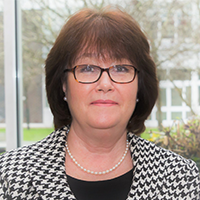About
Diane became interested in "Bio-transformations and Cytochromes P450" as an undergraduate and this was developed further during her PhD, a joint project between Imperial Cancer Research Fund, (now CRUK) and Swansea University (SU). Her post-doctoral career began at Sheffield University, firstly in the Genetics Department and later in the Wolfson Institute of Biotechnology, where she has pursued a research focus on moctobial cytochrome P450 ever since.
After a move from Sheffield to Aberystwyth University, Diane came full circle to Swansea University as a Reader and then Professor in the newly formed Swansea Clinical School, in 2004. Her research continues to be on Microbial Cytochrome P450 related to their biodiversity, including mycobacterial P450's and a range of fungi, with an emphasis on identifying targets for antimicrobial agents in both medicine and agriculture and the associated rise in resistance to current therapies. Diane has published more than 200 related peer reviewed papers.
Diane is SU Co-lead on a European Regional Development Fund (ERDF) funded project, BEACON. This is a £18.3 million project backed by EU and the Welsh Government. BEACON won the 2014 RegioStars prize for the best Regional Project in the EU and is celebrating 10 years (2020) of successful collaborations between Welsh HEI's and Industry.
Diane is a panel reviewer for UKRC grants and for the Netherlands Organisation for Scientific Research (NWO), Vidi grants within the Innovational Research Incentives Scheme of the Domain Science.
Diane sits on the University's Nominations Committee.
Throughout her career Diane has always been passionate about equality both in and out of the work place and has been part of the SU Athena SWAN charter work since 2008, first as a member of the SU self-assessment tear (SAT) gaining the Bronze award in 2009 and then as chair for the successful Bronze Award renewal in 2012. She has continued as a member of the SU SAT which gained a Silver Institutional award in 2017. Diane chairs the Medical School's EDI committee and SAT, the School was awarded Bronze in 2014, Silver in 2016 and Silver 2019. She is a founding member of the University Athena SWAN Strategy group and chairs and sits on UK Athena SWAN assessment panels. She acts as a critical friend to other departments within her own and other Institutions preparing their submissions.


